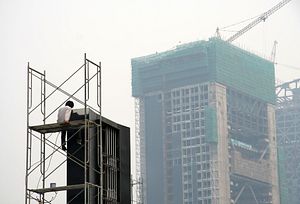China’s government has pursued a hard line against real estate developers during the past year by cutting buyer demand, controlling financing, and forcing companies out of the sector. With signs of distressed companies emerging and sector-driven investment slowing, China’s economic outlook looks less optimistic, and may worsen further if the government continues its tough line.
The real estate sector is vitally important to China’s economy, employing an estimated 29 million people, generating investment worth 7.9 percent of additional annual GDP in 2016, contributing up to 35 percent of local government fiscal revenue, and creating demand for China’s steel, cement, glass, and other industrial sectors.
But China’s real estate developers owe the banking sector a lot of money — RMB 2.8 trillion ($411 billion) to be precise — and most of that is due in the next two years. Developers have been on a debt-fueled expansion binge, taking on RMB 852 billion ($125 billion) of new debt between 2015 and 2016, exceeding the RMB 820 billion ($120 billion) taken on from 2010 to 2014.
With a heavy load of debt in mind, it’s a bad time for the Chinese government to be making it harder for developers to sell properties, but that’s exactly what they are doing.
Starting in the first quarter of 2016, the Chinese government has introduced a raft of measures, including higher minimum down payments, controls on multiple home ownership, and curbs on purchases by non-registered residents, to dampen buyer demand and cool rocketing prices.
Meanwhile, costs are rising for developers. After a huge year for sales in 2016, when residential real estate sales jumped 36.1 percent year-on-year (yoy), developers are aggressively trying to replenish their land banks, and that’s causing prices to rise. China Real Estate Information, a industry information provider, reported that average prices of land sold from January through June 2017 grew 32.6 percent yoy.
To add further pressure, the Chinese government is shutting down developers’ sources of credit. Since October 2016, the government has tightened domestic bond issuance rules, halted loans to finance land purchases, pressured lending by trust companies, and virtually stopped offshore bond issuances by real estate developers.
Narrower financing channels, plus the People’s Bank of China’s steady tightening of monetary policy, has raised financing costs. The PBoC has raised rates via open market operations and, when coupled with narrower financing channels, real estate developers have seen their financing costs rise 2 to 3 percentage points during the past six months, with some seeing rises of eight percentage points, according to Xinhua Finance.
Taken together, the increased pressure is starting to seriously impact China’s real estate developers, with signs of distress emerging. Chinese language reports cited the recent case of Aochen Real Estate, a Shenzhen-based developer, which is rumored to be in cash flow difficulties and owing RMB 30 million ($4.4 million) in unpaid wages.
The problem is so serious that Greenland Chairman Zhang Yuliang recently predicted that continued government pressure will see 20 to 30 percent of real estate firms go bankrupt every year for the foreseeable future.
Against this backdrop, many firms are looking to exit the industry, and this is spurring a wave of mergers and acquisitions. CRIC reported a total of 198 M&A cases, with deals worth RMB 401.5 billion ($58.9 billion) being made in 2016, up 43 percent yoy. Deals worth RMB 5.3 billion signed by Sunac China in the past month suggest this trend is extending into 2017.
While the developer sector is rationalizing and facing continued government policy pressure, the outlook for China’s economy looks weaker.
Real estate fixed asset investment, a major driver of China’s economy, showed a slower pace in May 2017, registering yoy growth of 8.6 percent, compared with 8.9 percent yoy in April and 9.2 percent yoy in March.
With policy pressure still dominant, weaker real estate driven investment is feeding expectations that China’s economy will grow at a slower pace in the second half of 2017 than the 6.9 percent yoy growth recorded in Q1 2017, before decelerating further to an estimated 5.9 percent in 2018.
It would be tempting to expect the Chinese government to reflate the real estate market in 2018 if economic growth slows. That is, after all, what they have done after previous downturns. That said, the government is seemingly committed to deleveraging, reform, and instilling further discipline on the real estate sector.
If that’s the case and policy controls continue for the foreseeable future, it would have a significant impact on China’s growth outlook for the coming years, and may justify the figures of 4.7 percent average GDP growth expected by the Economist Intelligence Unit for 2018 and 2019.

































